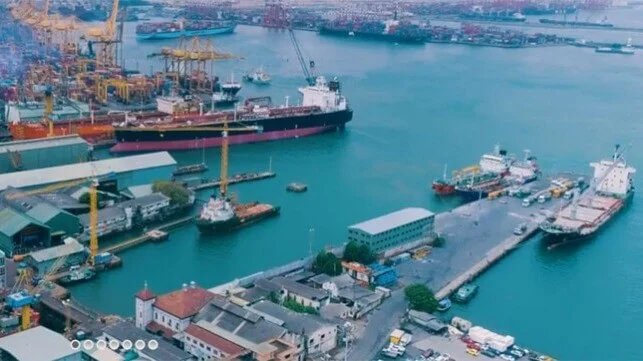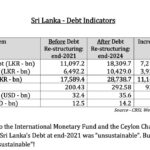April 2, 2025 Colombo Sri Lanka (LankaBIZ) – The Sri Lankan government’s decision to allow the divestment of Colombo Dockyard PLC—a strategic national asset— is likely to draw widespread criticism, with many likely to call for state intervention instead. According to sources government is planning to facilitate the divestment of Colombo Dockyard to Mazagon Dockyard an Indian company during Indian Prime Minister Narendra Modi’s visit to Sri Lanka in April 2025. The decision comes as Japan’s Onomichi Dockyard Company, which has held a 51% stake in Colombo Dockyard since 1993, announced plans to sell its majority shareholding. This move has raised concerns over national security, economic sovereignty, and transparency in the deal-making process.
The possible entry of an Indian company into Sri Lanka’s shipbuilding and repair sector has sparked significant controversy. Many industry experts argue that Sri Lanka possesses a wealth of local expertise in shipbuilding and maintenance, making foreign intervention unnecessary. The decision to allow an Indian firm to take control of such a critical infrastructure asset is seen by many as undermining local capabilities and raising serious questions about the country’s economic independence.
Critics are urging the government to take over Colombo Dockyard PLC as a commercial entity and operate it under state control. They argue that such a move would not only protect national interests but also prevent potential national security risks. Given the strategic importance of Colombo Dockyard in maintaining and servicing naval and commercial vessels, allowing foreign ownership—especially from a regional power like India—could have far-reaching implications.
The controversy surrounding this divestment highlights broader concerns over foreign influence in Sri Lanka’s strategic industries. With the government facing mounting pressure to reconsider its decision, it remains to be seen whether national interests will take precedence over economic expediency in the coming months.
A Strategic Asset on Sale
Colombo Dockyard, established in 1974 and strategically located within the Port of Colombo, is Sri Lanka’s leading shipbuilding and repair facility. It has built both military and civilian vessels for domestic and international clients. The shipyard’s capabilities, including its expertise in constructing offshore patrol vessels and other sophisticated maritime assets, make it a crucial component of Sri Lanka’s defense and economic infrastructure.
Despite its strategic importance, the government has opted not to intervene in acquiring the 51% stake, instead allowing private investors to take over. This decision has sparked criticism from economists, national security analysts, and opposition leaders, who argue that the asset should be brought under state control to prevent potential exploitation by foreign entities.
“Colombo Dockyard is not just another business; it is a national security asset,” said an opposition lawmaker. “By handing over control to a private or foreign investor, the government is jeopardizing our economic and defense interests.”
Financial Turmoil and Investor Concerns
Colombo Dockyard has faced significant financial challenges in recent years, reporting a loss of nearly $38 million in 2023, with revenues in 2024 plummeting by a third. While the government has cited these financial difficulties as a reason for seeking private investment, critics argue that state intervention could revitalize the shipyard, ensuring its long-term stability and strategic independence.
Potential investors have raised concerns over suspected transfer pricing practices that allegedly benefited Onomichi Dockyard Japan at the expense of Colombo Dockyard PLC. Analysts claim that for decades, Onomichi engaged in price manipulation to funnel profits out of Sri Lanka, weakening Colombo Dockyard’s financial standing and justifying the eventual sale of its majority stake.
Decades of Alleged Corruption by Onomichi Dockyard Japan
For over three decades, Onomichi Dockyard Japan has faced allegations of engaging in corrupt practices that undermined Sri Lanka’s economic interests. Reports suggest that the company systematically transferred profits out of Colombo Dockyard through non-transparent financial arrangements, overpricing imports, and underpricing exports to affiliated entities. These suspected transfer pricing tactics resulted in chronic underperformance of the Sri Lankan facility, despite its high demand and strategic location.
“There is credible evidence suggesting that Onomichi engaged in unfair financial practices to siphon profits away from Sri Lanka,” said a financial analyst. “This should have been investigated thoroughly before allowing the company to exit and hand over control to another foreign investor.”
Call for Government Accountability
The government’s decision has led to growing calls for an independent investigation into the financial dealings of Onomichi Dockyard and the terms of the proposed sale. Opposition parties and trade unions have demanded greater transparency, warning that the current course of action could lead to the further erosion of Sri Lanka’s industrial and strategic capabilities.
As the sale process unfolds, Sri Lankans remain divided on the best course of action. While some see private investment as a necessary move to rescue the financially struggling shipyard, others argue that the government is making a grave mistake by relinquishing control over such a vital national asset.
The coming months will determine the fate of Colombo Dockyard and whether Sri Lanka’s leaders will heed calls for greater transparency and national security considerations in this controversial divestment.
Company Report















